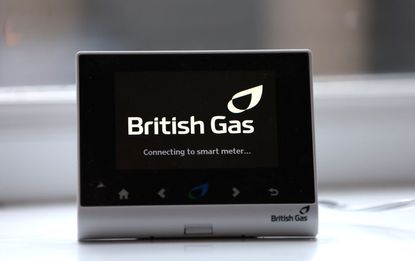British Gas to offer half-price electricity on Sundays to 200,000 customers
British Gas offering certain smart meter users a 50% discount on their electricity on Sundays this summer. We explain everything you need to know


British Gas is offering certain customers with a smart meter half-price electricity on Sundays as part of its PeakSave scheme.
The discount will run from 11am to 4pm every Sunday from 25 June to 24 September.
The energy giant says about 200,000 customers stand to benefit, collectively saving up to £5 million by the end of September.
Subscribe to MoneyWeek
Subscribe to MoneyWeek today and get your first six magazine issues absolutely FREE

Sign up to Money Morning
Don't miss the latest investment and personal finances news, market analysis, plus money-saving tips with our free twice-daily newsletter
Don't miss the latest investment and personal finances news, market analysis, plus money-saving tips with our free twice-daily newsletter
According to British Gas, there is typically a greater amount of renewables available in the UK’s energy system on a Sunday because of lower demand from businesses, which reduces the requirement for energy generated by fossil fuels.
Therefore, it says its new “Summer Sundays” initiative encourages the use of greener energy as well as helping customers save money.
“The electricity grid continues to face enormous pressures and we recognise the need to better manage periods of peak demand to ensure a safe, constant and more sustainable supply across the UK,” said Catherine O’Kelly, managing director of British Gas Energy.
“We look forward to welcoming even more customers to the PeakSave scheme and helping them make savings on their bills this summer.”
What is the British Gas PeakSave scheme?
PeakSave began as part of the National Grid’s Demand Flexibility Service, which tests how to manage consumption to support a greener energy supply, for example offering customers rewards to reduce their energy usage during peak times.
O’Kelly commented: “Since launching PeakSave last year, we have gained valuable insight on how we can control periods of high demand on the grid.
“We want to increase the number of customers who have signed up to the scheme so we can understand its true potential and achieve a greener and more controlled grid.”
The Summer Sundays discount is only available to British Gas customers with smart meters who are signed up to its PeakSave scheme.
If you're not already part of PeakSave, you can register to join on the British Gas website. You will need a smart meter to be eligible.
Energy suppliers like E.on, EDF, Octopus and Ovo - as well as British Gas - have previously run schemes encouraging customers to reduce their energy usage at peak times during the winter, in return for payments or discounts.
How does the British Gas Summer Sundays discount work?
The discount is available to new and existing PeakSave customers - you don’t need to sign up to Summer Sundays, you'll get the discount automatically as long as you're part of PeakSave.
All savings will appear as a credit on customers’ energy bills. So, you'll be billed for the electricity you use as normal, and British Gas will then credit your account with half of what you spent within two weeks of each event.
The discount will be taken off your unit rate only; the standing charge will not be discounted.
Your normal tariff will apply outside the discount period. For most people, this is the government's Energy Price Guarantee, which is being replaced by the lower Energy Price Cap on 1 July.
But if you're on a fixed-rate deal, you'll pay those rates instead.
Is this a good deal?
If you’re a British Gas customer with a smart meter it’s a no-brainer to make sure you’re signed up to PeakSave.
It doesn’t cost anything, and instead you’ll save money. British Gas says a typical household could save about £29 over the summer, depending on their usage.
Research by the energy supplier shows that two-fifths of consumers say they use more electricity on Sundays compared with any other day of the week to carry out household chores and enjoy home comforts.
The most popular Sunday activities include drinking lots of tea and coffee (58%), cooking a Sunday roast (45%), doing household chores like washing clothes (59%) and hoovering (48%), and catching up on television programmes (33%).
To increase the savings, you may like to shift your normal activities and do more energy-intensive tasks on a Sunday, such as using the oven and washing clothes.
Some cheaper fixed tariffs are starting to emerge in the energy market, so don’t let this Sunday discount keep you from switching to a better deal if you spot one, as you could get much bigger savings by moving to a cheaper tariff.
Have a look at our guide to fixed energy tariffs for all the latest deals.
Ruth is passionate about helping people feel more confident about their finances. She was previously editor of Times Money Mentor, and prior to that was deputy Money editor at The Sunday Times.
A multi-award winning journalist, Ruth started her career on a pensions magazine at the FT Group, and has also worked at Money Observer and Money Advice Service.
Outside of work, she is a mum to two young children, a magistrate and an NHS volunteer.
-
-
 Top-quality small companies with big scope for long-term growth
Top-quality small companies with big scope for long-term growthA professional investor tells us where he’d put his money. This week: Dr Gareth Blades, analyst at Amati Global Investors, highlights three favourites.
By Nicole García Mérida Published
-
 Starling Bank hikes fixed savings rate to 5.25%
Starling Bank hikes fixed savings rate to 5.25%Starling Bank has hiked the rate on its fixed savings which has shot up from 3.25% to 5.25% - but how does it compare to the rest of the market?
By Vaishali Varu Published
-
 August NS&I Premium Bond winners unveiled - have you scooped £1m?
August NS&I Premium Bond winners unveiled - have you scooped £1m?Two lucky NS&I Premium Bond winners are now millionaires in the August draw. Find out here if you are one of them
By Tom Higgins Published
-
 Savings rates more than double in a year as challenger banks top the best buy tables
Savings rates more than double in a year as challenger banks top the best buy tablesThe best savings rates have doubled - and in some cases tripled - in a year, with challenger banks offering the highest rates. While they are still no match for inflation, we look at what you could be earning.
By Ruth Emery Published
-
 Midlife MOT: what is it and who can get one?
Midlife MOT: what is it and who can get one?The government has launched an online midlife MOT to help older workers with financial planning, health guidance and career skills. But how does it work, who can get one and would you pass it?
By Ruth Emery Published
-
 Coventry Building Society launches new best easy access savings account
Coventry Building Society launches new best easy access savings accountCoventry Building Society's deal tops our easy access savings account list, but could your cash be put to better use?
By Tom Higgins Published
-
 NS&I boosts fixed-term savings rates
NS&I boosts fixed-term savings ratesThe NS&I, the government-backed savings institution has mirrored recent rate rises seen elsewhere in the market.
By Tom Higgins Published
-
 Should you let AI give you financial advice?
Should you let AI give you financial advice?Can AI fill the financial advice gap? Kalpana Fitzpatrick looks at the pros and cons of using AI to guide your finances.
By Kalpana Fitzpatrick Published
-
 Small pension pots to be consolidated, says DWP
Small pension pots to be consolidated, says DWPWorkplace pension schemes worth less than £1,000 that become “deferred” when a saver changes jobs will be consolidated under a new system
By Ruth Emery Published
-
 Watchdog summons banks to explain paltry savings rates
Watchdog summons banks to explain paltry savings ratesSavings rates trail mortgage rates - and the financial watchdog has summoned banks to a meeting amid concerns of profiteering.
By Katie Binns Last updated









